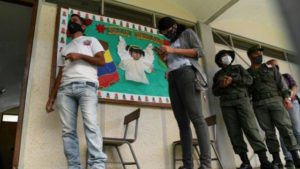 President Nicolas Maduro hailed a “new dawn” in Venezuela on Monday as he celebrated his now total grip on power following a predictable triumph in polls boycotted by the opposition and slammed as a farce by international powers.
President Nicolas Maduro hailed a “new dawn” in Venezuela on Monday as he celebrated his now total grip on power following a predictable triumph in polls boycotted by the opposition and slammed as a farce by international powers.
Victory for Maduro’s ruling Socialist Party in Sunday’s legislative elections gave him control of an expanded 227-seat National Assembly, the only branch of government previously not in his hands.
“Today Venezuela wakes up with a new dawn of peace, joy, unity and strengthening of democratic institutions,” Maduro said on Twitter.
Maduro and his left-wing allies had 68.4 percent of the vote with 98.6 percent of ballots counted, the National Electoral Council said.
Most Venezuelans turned their back on the polls however, with turnout at just 31 percent.
Maduro’s victory nonetheless further weakens US-backed opposition leader Juan Guaido, who led the boycott after calling the vote “a fraud.”
In a ceremony with Russian observers at the presidential palace, Maduro celebrated that his party and its allies had won “almost 250” of the 277 Assembly seats. The National Electoral Council has not yet given the final distribution of seats.
US Secretary of State Mike Pompeo said Washington would continue to recognize Guaido “and the legitimate National Assembly.”
“The international community cannot allow Maduro, who is in power illegitimately because he stole the 2018 election, to gain from stealing a second election,” Pompeo said in a statement.
He described the election as a “farce” and a bid to install a “complicit, puppet National Assembly, beholden only to Maduro.”
Britain called the elections “deeply flawed” and said it continued to recognize Guaido as Assembly speaker as well as Venezuela’s interim president.
Caracas ally Russia, however, hailed the elections as more “transparent than in some countries which usually present themselves as an ‘example of democracy.'”
Canada and the Organization of American States also rejected the result, while the European Union said the vote showed “a lack of respect for political pluralism.”
Washington, Guaido’s main ally, is leading pressure to oust Maduro with economic sanctions, including an oil embargo in force since April 2019.
Maduro said he would call on US President-elect Joe Biden to lift the sanctions.
The opposition had controlled the National Assembly since 2015.
Maduro sidelined the body in 2017 by creating an all-powerful Constituent Assembly stacked with his supporters. The Supreme Court meanwhile declared legislation passed by the National Assembly null and void.
– Crippling crisis –
The election came with the country in a deep political and economic crisis — suffocated by runaway inflation, paralyzed in endless queues for petrol, lacking water and gas supplies, and afflicted by power cuts.
Since November 2019, inflation has reached 4,000 percent.
Maduro, a former bus driver who became president on the death of his mentor Hugo Chavez in 2013, was re-elected in 2018 in fraud-tainted polls — also boycotted by opposition parties — a victory that much of the international community branded illegitimate.
The United States, the European Union and many Latin American countries have long blamed Venezuela’s crippling economic crisis on Maduro’s repression and misrule.
They backed Guaido when the National Assembly speaker proclaimed himself interim president in January of last year.
Guaido, 37, called on voters to stay at home on grounds that “free and fair” conditions for holding elections do not exist.
Instead he and his allies opened a week-long plebiscite Monday, seeking public support to prolong the current National Assembly’s mandate until “free, verifiable and transparent” elections can be held.
The referendum-style “popular consultation,” using the web and mobile phone apps, calls for the end of Maduro’s “usurpation” of the presidency.
“It’s the chance to transform this rejection …into strength, into mobilization,” he told a press conference Monday, hailing a “higher than expected” turnout for the virtual vote, though he declined to give figures.
On Saturday, supporters can vote in-person at polling booths in Venezuela.
US tech firm Voatz, which has used the technology in polls in West Virginia, Colorado and Utah, is using blockchain technology to secure the online poll.
However, the results will not be binding, as Maduro exercises control of the country’s institutions, including the Supreme Court, the electoral authority and the powerful military.
Some analysts believe Guaido has backed himself into a corner by boycotting the official election, and in doing so risked losing the support of his international backers.
“Guaido will lose his formal legitimacy as president of the National Assembly in January, when Maduro will consolidate total power,” Michael Shifter, president of the Inter-American Dialogue, told AFP.
